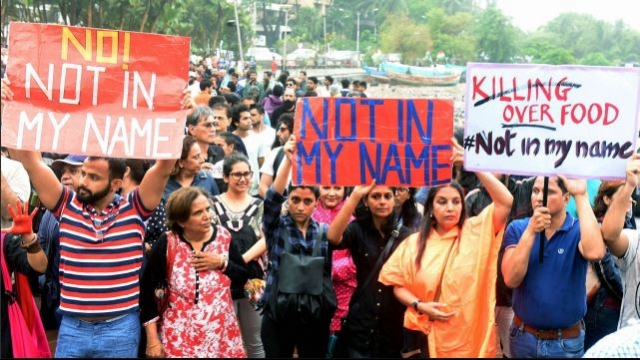The woes of living in India are not just confined to poor living standards, shoddy governance, rickety infrastructure, and ubiquitous lawlessness; one also has to endure unbearable ennui. Every event, along with its sequels, is so predictable that one feels like watching a third-rate, masala-filled Hindi movie whose every next scene you can predict. The Not In My Name protest all over the country in reaction to the murders committed by saffron cowboys was so much on predictable lines that I feel… well, bored. Not incensed with the government, not in empathy with the protestors. The killing of so many Muslims in the name of the cow is indeed unfortunate, but everything else about the violent incidents is a charade, played out by political and thought leaders. A boring, banal charade.
I visited Jantar Mantar on Wednesday, where a large crowd had gathered to protest violence against Muslims and Dalits. The atmosphere was exactly what I had anticipated: professional radicals mouthing the very same slogans they had been mouthing for ages; banners, placards, posters, speeches, poetry upholding the grand ideals of peace, amity, etc. I felt like I have been there, done that.
Half the men had beards of various sizes and shapes, in various stages of dishevelment; most of them looked like the directors of ‘art movies.’ Bohemian posturing, sanctimoniousness, and fake rebellion defined the women. It was the Fabindia crowd; it was like this in the 1980s when I was in the university; it was like this in the 1990s; it was like this in the 2000s; it hasn’t changed till date.
And I am not just talking about the looks. The entire milieu, the entire class, the intellectual class, all their dogmas and doctrines, premises and principles, shibboleths and slogans—everything is frozen in time. Everything is so jaded, faded, clichéd. And borrowed, plagiarized from the West. The very name, Not In My Name, is taken from the anti-government protesters in America who opposed the Vietnam War in the 1970s. Black Lives Matter, which is recent, becomes Muslim Lives Matter at Jantar Mantar.
“We are outraged at the systematic violence. The state has done nothing; there has been a deafening silence from the powers that be,” said filmmaker Saba Dewan, whose Facebook post last week triggered the all-India protest. The singer Rabbi Shergill was also there at Jantar Mantar. In Mumbai, actors Konkona Sen Sharma, Ranveer Shorey, Kalki Koechlin, and Shabana Azmi participated in the protest. In Kolkata, director-actor Aparna Sen, actor Dhritiman Chatterjee, and singer-music composer Anjan Dutta and the academic Partha Chatterjee (of Gen-Rawat-is-Gen-Dyer fame) joined in to show solidarity with the movement. In Bengaluru, there was the historian Ramchandra Guha. All progressives, secularists, liberals, parlor pinks, all the beautiful people. In short, everybody who despises Narendra Modi.
Unsurprisingly, this delighted the Opposition, which was represented at Jantar Mantar by such worthies as Congress leader Randeep Surjewala, Delhi Deputy Chief Minister Manish Sisodia, JD(U) veteran K.C. Tyagi, and the CPI’s D. Raja. After all, it was this rainbow coalition of Leftists, secularists, liberals, etc., that kept the bugbear of ‘communalism’ animated to keep the BJP out of power for decades.
The media coverage and reactions to the protest were also on expected lines. The anti-Modi crowd was jubilant at what they thought was a mass upsurge against the Prime Minister and his Hindutva agenda. Pro-Hindutva commentators, too, came up with familiar, jaded tirades: Where were these people when Kashmiri Pandits were thrown out of their own homeland? Why do they remain silent on triple talaq?
Prime Minister Modi too reacted characteristically. Speaking at an event at Sabarmati Ashram in Ahmedabad, he passionately made a case for peace: “No one spoke about protecting cows more than Mahatma Gandhi and Acharya Vinoba Bhave. Yes it should be done,” Modi said. “[But] killing people in the name of ‘gau bhakti’ [devotion to the cow] is not acceptable. This is not something Mahatma Gandhi would approve.”
In August last year, too, in response to reports that Dalits were being beaten over suspicion regarding cow slaughter, he had made an equally fervent appeal—to no avail.
As I said, it is like watching an atrocious Hindi movie; everything is so nauseatingly familiar, so disgusting. The only difference being that this is life, not a movie that would end after some time, not something you could escape by walking out of the theatre. We, the people of India, are condemned to suffer the theatre of the familiar.
Photo: Courtesy wwwdnaindia.com
